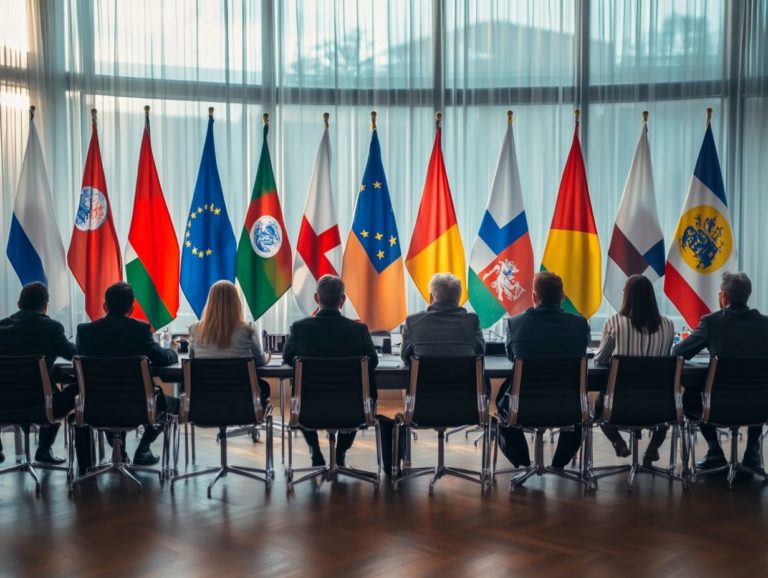International IP Law: What’s Next?
Understanding IP law is crucial today. It affects how we innovate and protect our creations. Intellectual property (IP) law is fundamental to today s global economy, serving as a guardian for creators while fostering a culture of innovation.
This overview delves into international IP law, defining its scope, current landscape, and the key players shaping its evolution. You ll explore the challenges and controversies related to enforcement and protection. This will culminate in a discussion on future predictions and potential shifts in this dynamic field.
It also sheds light on how these laws affect both businesses and individuals, enabling you to grasp their significance in our interconnected world.
Contents
Key Takeaways:

International IP law is crucial for protecting intellectual property rights globally and promoting innovation and creativity. Despite the existence of key players and agreements, challenges persist in enforcing and protecting IP rights, leading to controversies and debates. Get ready! The future of international IP law is set for exciting changes that could reshape the landscape for businesses and individuals.
Overview of International IP Law
International IP law serves as a crucial framework for the protection and enforcement of intellectual property rights across borders. It significantly influences diverse sectors, from the creative industries to the digital marketplace.
As globalization continues to accelerate, the necessity to comply with international treaties and regional regulations, such as EU legislation, becomes ever more critical for fostering economic growth and innovation.
By establishing robust legal frameworks and compliance obligations, nations can effectively support the rights of creators and businesses. This approach allows them to adeptly navigate the intricate landscape of trademark law, copyright law, and design protection.
Definition and Importance
Intellectual property (IP) encompasses the legal rights that protect your creative endeavors be it inventions, designs, or artistic works. It plays a crucial role in nurturing innovation and creativity in today s digital landscape.
This protection gives you and your business the power to enjoy the fruits of your hard work and investments. It fosters an environment ripe for more advancements.
The components of IP, including trademarks, copyrights, patents, and trade secrets, each serve a unique purpose in safeguarding your ideas and products.
In the fast-paced digital marketplace, the Unified Patent Court is essential. It streamlines patent litigation across Europe and significantly reduces instances of infringement.
Copyright protection can also overlap with patent disputes, highlighting the need for strong data privacy measures to protect sensitive information and maintain the trust of both users and intellectual property holders.
Current State of International IP Law
The current landscape of international IP law showcases a constantly changing mix of legal changes and challenges.
As technology continues to evolve and innovative business models, especially in e-commerce, take shape, significant court decisions and legislative actions are increasingly shaping this field.
Key Players and Agreements

Key players in international IP law encompass organizations like WIPO, which oversees vital agreements such as the TRIPS agreement and the Madrid Protocol both essential for harmonizing IP practices on a global scale.
WIPO, the World Intellectual Property Organization, plays a crucial role in cultivating cooperation among nations to safeguard and enforce intellectual property rights. The TRIPS agreement establishes minimum standards for IP protection and enforcement, influencing domestic laws and ensuring that member states align their practices with global norms.
This agreement not only strengthens the protection of trademarks, patents, and copyrights but also strives to strike a balance between the interests of creators and users worldwide.
On the other hand, the Madrid Protocol simplifies the trademark registration process across multiple jurisdictions. It enables businesses to protect their brands internationally with enhanced ease and efficiency.
Challenges and Controversies
International IP law faces challenges and controversies. Key issues include copyright infringement, platform liability, and protecting trade secrets.
As we navigate a world increasingly shaped by AI that creates new content, like images or text, understanding these complexities becomes crucial.
Issues with Enforcement and Protection
Enforcement and protection issues in international IP law arise from weak legal frameworks and compliance challenges. These lead to lengthy patent disputes that stifle economic growth.
These challenges are especially evident when new technologies advance faster than current regulations, threatening the foundation of intellectual property rights.
Consider a tech startup that develops an innovative algorithm. The patenting process for such innovations can lead to disputes over ownership, particularly when companies operate across borders.
The use of algorithms to manage processes in tech further complicates matters. Algorithms in production and delivery can create confusion in patent claims, where traditional legal interpretations may not suffice.
These complexities strain relationships between inventors and corporations and disrupt market dynamics. This highlights the urgent need for reform in international legal frameworks.
The Future of International IP Law
Get ready! EU laws are about to reshape international IP law in exciting ways. This evolution addresses challenges posed by AI-generated content and its impact on intellectual property rights.
Stay alert! The landscape is changing rapidly, adapting to new challenges and creating a more nuanced approach to protecting creativity and innovation in this digital age.
Predictions and Potential Changes

Predictions for the future of international IP law suggest that you will navigate a landscape shaped by fast legal developments and strict compliance regulations.
As industries adapt to these transformations, unique challenges will arise in safeguarding intellectual property while embracing innovation.
The convergence of technology and law will prompt scrutiny of existing frameworks, urging you to reassess your strategies for protecting your assets.
In this digital economy, staying ahead of regulatory changes is vital for sustainable growth. This evolution will impact your compliance efforts and reshape the competitive landscape, requiring agility and adherence to new IP norms for success.
Implications for Businesses and Individuals
The implications of international IP law for you whether as a business or an individual are significant. They influence everything from your intellectual property rights and licensing agreements to compliance obligations in today’s digital landscape.
Grasping these nuances is essential for navigating the complexities of a global economy.
How International IP Law Affects Different Parties
International IP law impacts various stakeholders in unique ways. It shapes how businesses safeguard their intellectual property rights, manage trade secrets, and navigate regulations in the ever-evolving creative sector and digital marketplace.
For businesses, navigating the complicated world of IP law is essential. Strong frameworks are vital to protect innovations and maintain a competitive edge. In contrast, individuals like independent creators or freelancers often face disadvantages. Limited access to legal resources can expose them to infringement risks.
Compliance regulations guide both groups, ensuring fair practices and fostering an environment where creativity can thrive. In the digital marketplace, managing trade secrets is even more significant.
The shared and often volatile nature of online content requires a careful balance between transparency and protection to uphold the integrity of creative work.
Frequently Asked Questions
1. What is International IP Law and why is it important?

International Intellectual Property Law (IP Law) refers to the legal framework that governs the protection and enforcement of intellectual property rights like patents, trademarks, and copyrights on a global scale. It is important because it promotes innovation, creativity, and economic growth by ensuring that creators and inventors can profit from their works.
2. How does International IP Law affect businesses and individuals?
International IP Law provides businesses and individuals with legal protection for their intellectual property assets. This allows them to commercialize their innovations and creations. It also sets standards for fair competition, encouraging businesses to invest in research and development to remain competitive globally.
3. What challenges does International IP Law currently face?
One main challenge is the constantly evolving nature of technology. With advancements in digital tech and the rise of the internet, enforcing intellectual property rights and combating online piracy has become more complex. Ongoing debates also exist about balancing IP protection with access to information and innovation.
4. What are some recent developments in International IP Law?
Significant developments include the adoption of the Trade-Related Aspects of Intellectual Property Rights (TRIPS) Agreement by the World Trade Organization, which sets minimum standards for IP protection and enforcement. Other international treaties, such as the WIPO Copyright Treaty and the Anti-Counterfeiting Trade Agreement, aim to strengthen global IP protection.
5. How can businesses and individuals stay updated on changes in International IP Law?
Staying informed is essential for businesses and individuals looking to safeguard their rights! They can consult legal experts, attend seminars and conferences, and keep up with the latest developments in the field. Following organizations like the World Intellectual Property Organization and the International Trademark Association can also provide valuable updates and resources.
6. What’s next for International IP Law?
The future of International IP Law will be shaped by advancements in technology and global trade. Ongoing debates will likely continue around digital copyright, patent protections for emerging technologies, and balancing IP rights with competition. Stakeholders should engage in discussions, share their views, and help shape the future of IP law!






